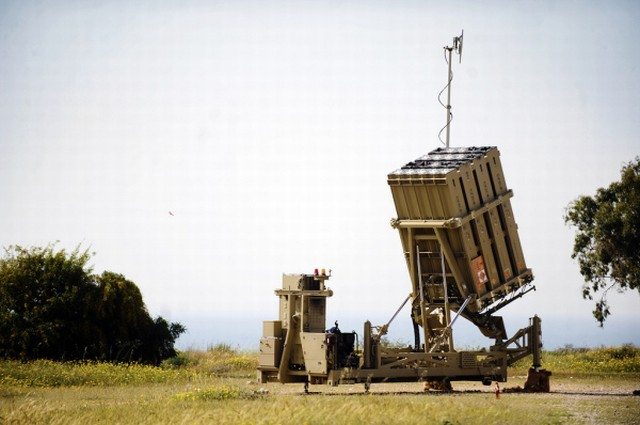After passing through an orchard of fruit-laden apple trees and passing fields of corn and vegetables, it’s jarring to come across a rocket launcher.
But that’s the scene near this southern Israeli city.
Defense Secretary Leon E. Panetta and Israeli Defense Minister Ehud Barak visited with Israeli air force personnel protecting Ashkelon from terrorist attacks. The city is less than 10 miles away from Gaza, and terrorists there have launched hundreds of missiles and mortar rounds into Israel.
The rocket launcher, radar and battle management and control module in this pasture are part of the Iron Dome network designed to track and shoot down missiles fired at Israeli cities.
This is a country constantly on its guard, even as regular workaday life continues. About 200 meters from the battery are apartment buildings with wash hanging off the balconies and a beautifully appointed playground. Farmers work in the fields, and cars whiz by on the Israeli version of an interstate. These are targets for the terrorists who use Gaza as a launching point.
The system has shot down scores of missiles that would have killed Israeli citizens since it was fielded in April 2011. During a joint news conference with Barak at the battery, Panetta said Iron Dome “has been a game changer for Israel’s security. It has saved Israeli lives.” Barak said it has a more than 80 percent success rate.
The battery also is a concrete example of how the U.S.-Israeli defense partnership works. The Israelis developed Iron Dome, and the United States has committed more than $205 million to fielding the system. Last week, President Barack Obama signed a law providing another $70 million to field more batteries this fiscal year. Panetta said his goal is to ensure Israel has the funding it needs in coming fiscal years to complete fielding the system.
But the defense relationship is more than just one system. Panetta said the defense relationship — based on shared values and goals — “is stronger than it has ever been before.”
The partnership between the two nations is more important today because of the security challenges arising from the region, the secretary said. Syria, Iran and the threats of terrorism and nuclear and missile proliferation are just some of the challenges facing the region and the world.
“Our ties with the United States have expanded in a range of areas including intelligence, high-tech and securing the qualitative military edge of Israel,” the Israeli defense minister said. “The defense relationship underpins greater and wider cooperation between the two countries.”
Another example of the U.S. commitment to Israel is Israel’s involvement in the joint strike fighter program, the secretary said.
“Israel is the only country in the Middle East participating in this program,” Panetta said. “This will ensure Israel’s air superiority for years to come.”










